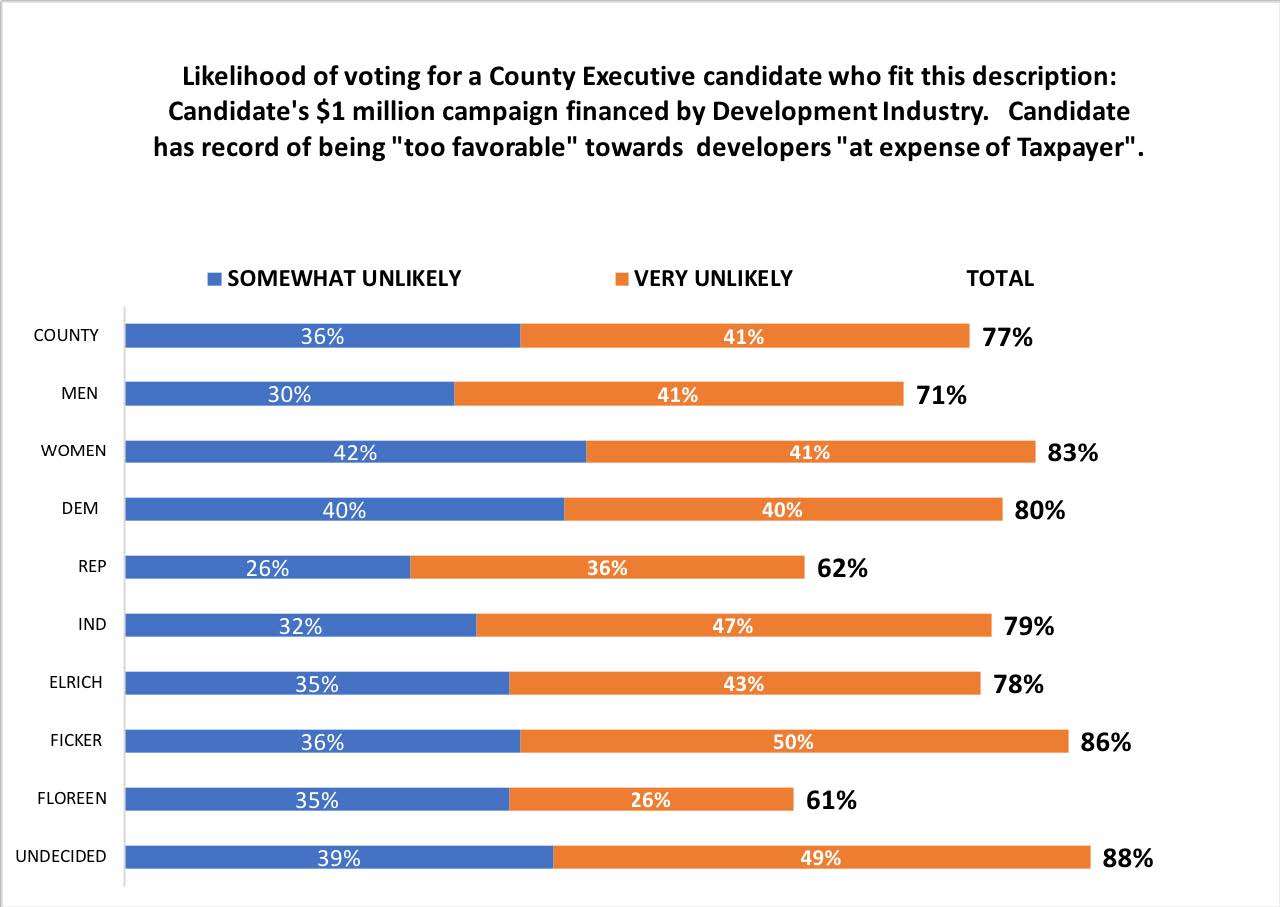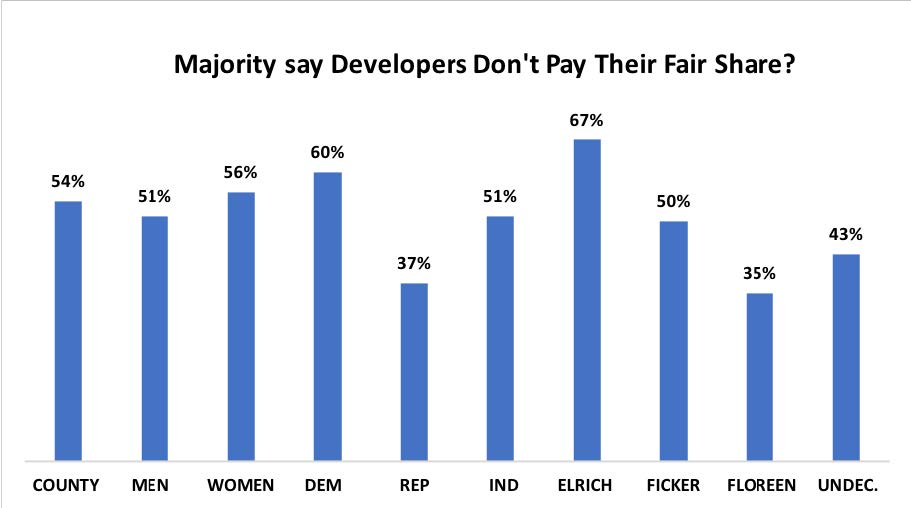In this county executive race, I’ve been looking for someone who can shake things up a bit. This doesn’t mean that I think Montgomery County is a bad place to live or that Ike Leggett has done a bad job. On the contrary, County Executive Leggett saw us through a deep recession and protected key county services by making tough choices. I grew up and love living here.
But Montgomery County is not on a sustainable path. We need to do more to encourage employment and economic growth. The current model of county government cannot continue as it relies on ever greater expenditures that we still have trouble meeting even now that the recession is behind us.
As a result, I’ve been looking for a candidate for county executive who recognizes our many manifest strengths but is unafraid to try new solutions. I’d like our new county executive, whatever their political perspective, not to feel trapped by how we’ve handled matters in the past.
We have a number of excellent candidates this year. As we head down the home stretch of what has been an unusually hard fought and negative campaign by Montgomery County standards, tempers are beginning to fray. I hope we can all take a deep breath and recognize that just about all of the candidates have the skills required to serve ably as county executive.
Rose Krasnow is a triple threat in terms of experience working on Wall Street, having lead a major city government in Rockville, and holding a senior position at the Planning Board. If you speak with her, it rapidly becomes clear that she is extremely fluent – more than most sitting politicians – in the complex issues of the budget and planning. At the same time, her campaign’s emphasis on experience has left me wondering how she’d be innovative beyond favoring growth.
I have long made clear that George Leventhal is temperamentally unsuited to be county executive. Nonetheless, I’d regard it as a sign from above that this blog should continue for another four to eight years if he won, as he and Robin Ficker provide more than enough copy. George is already wearing Superman outfits. Can we get him into cheetah shorts? Seriously though, his support from a group that wants massive new development on River Road, despite no plan for transit there, and for rezoning single-family neighborhoods for apartment buildings gives me the heebie-jeebies.
Bill Frick knows how politics works from his experience in the House of Delegates. Yet he is outside county government and has a real zest for restructuring it, as his leadership in taking on entrenched interests supporting our county’s liquor monopoly demonstrates. Like Rose, he’d like to get the county’s growth engine moving again. Unfortunately, his campaign just doesn’t seem to have taken off.
In my view, Roger Berliner has the strongest “insider” case to make. He has a number of nice accomplishments under his belt, including good work on the environment. Compared to many, he has a far more intuitive understanding of the perspective of ordinary residents on issues such as PEPCO service and the impact of federal tax changes on county residents. He has been making the case that he knows how to innovate (think evolution, not revolution) and has had good success at building coalitions on the Council. Roger has struggled because it’s an anti-establishment year and David Blair has taken much of the oxygen his campaign needs.
That leaves Marc Elrich and David Blair, who are seen as the leading two candidates despite the absence of any public polling data. Despite having served on the Council for three terms, Marc Elrich is unquestionably still an outsider who is not part of the Rockville consensus. He has never been elected council chair. While some might see this as a sign he doesn’t play well with others, it is more of a badge of honor in a year when voters are highly critical of the Council.
Marc makes many happy but others quite nervous because of his strong progressive viewpoint. But he simply is not Montgomery County’s version of Hugo Chavez. More importantly, he is not some ideologue who is all hat and no cattle. This is a candidate who has thoughtful, practical, concrete ideas on how to make meaningful change that benefits all county residents. His plan for countywide BRT remains the best, biggest idea proposed to combat transportation problems that cause development-limiting and soul-killing traffic in a long time.
In Marc’s case, his professed desire to help “all residents” is not simply a code for only the poorest, though his passion for politics stems from working to help people who are struggling. Marc gets that the middle class face increasing burdens. Unlike some progressives, he also understands fully that the county cannot flourish without its share of successful businesses and upper class residents, so demonizing them is not the solution.
Marc hasn’t held executive positions previously but has clear ideas about how he would restructure county government from day one. One concern has been that he has a progressive candidate would cause skittish business to shy away. Except that I think business would quickly see that, while we’d have some real change, the People’s Republic is not upon us.
David Blair has burst on to the political scene thanks to the political ads that he has been able to self-fund and two editorials endorsing his candidacy from the Washington Post. I’ve met David but since he hasn’t previously had a high local profile or been active in politics, he is less of a known quantity to me.
As with Marc Elrich, I would ignore stereotypes that suggest David Blair is the boogeyman is disguise. His having been a Republican many years ago should not be disqualifying. Yes, he is a businessman running for office but he is not Trump II. Though it’s a low bar, I see no sign that he shares any of Trump’s repulsive bigoted narcissistic tendencies. People who know Blair think he is a terrific guy and would be a great county executive.
At the same time, I have some concern with plutocratic politics. I admire successful businessmen but don’t know that his success always translates into political acumen and am uneasy with the idea that the ability to spend a lot of money on a political campaign is a qualification for public office. But not all wealthy businessmen are the same. Jim Shea, a trailing gubernatorial candidate, has been deeply involved in the Baltimore community for years, and has lots of thoughtful ideas for Maryland.
David Blair brings some real assets to the table. He would have instant credibility with the business community. Unquestionably, he has executive skills. Unlike many executives, he seemingly has the ability to hear people and listen to them, as well as give marching orders. If elected, he’ll need to develop them further in order to work with a Council that doesn’t work for him. I think he’ll have the ability to run with good ideas even if they didn’t pop out of his own head.
I’m still wondering how much of a change agent David Blair would be as county executive. On the plus side, he’s an outsider who is not wedded to current perspectives and has articulated various fresh policy ideas. Nevertheless, it’s unclear to me how much change this would mean in practice. I’ve heard that he wants to retain much of the current administration. When I asked the campaign about this, they replied:
We are committed to ensuring the best and brightest lead our departments and are fortunate that many of these leaders are already in place. We will evaluate each position and our approach will be comprehensive, transparent and inclusive.
Voters can view this as a sensible process for ensuring orderly turnover and acknowledging that many good people are already in place who would know how to carry out needed reforms. Alternatively, others will see this as someone who isn’t quite ready to hit the ground running and is still learning about county government departments.
The other concern from my perspective is the need for more business versus residential development. Though there is a lot of residential development slated to go ahead, developers want more density and development for the same reason that government employees want higher salaries.
Except residential development is different from other kinds of business because it brings new residents who demand a welter of more expensive services. In particular, few residents are net contributors to the county budget while they have kids in school, as education takes up half of the county budget.
Our infrastructure is already strained. We need more business beyond residential development to bring in the revenue to pay for it. As a businessman, I think David Blair grasps that idea well and has emphasized business in his campaign. But his major outside funding and backers comes from the development industry.
Final Thoughts
Like many candidates, I’m grateful that the primary will be over tomorrow night. Not to flail a dead horse, but remember that we have a lot of good people running for office and respect the choices of our fellow citizens. Let’s also comfort and thank those who run but don’t win. Running for office isn’t easy and Montgomery is fortunate to have so many willing to put themselves out there.




